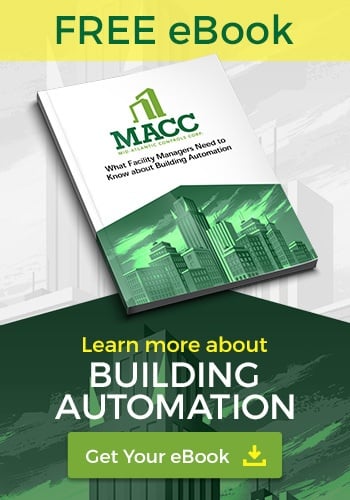 If you’re the manager of a large commercial or residential property, you already know how much rising energy and maintenance costs affect your bottom line. And while the savings promised by increased building automation sound tempting, you might be worried about getting investors, owners, and anchor tenants on board for expensive and disruptive upgrades.
If you’re the manager of a large commercial or residential property, you already know how much rising energy and maintenance costs affect your bottom line. And while the savings promised by increased building automation sound tempting, you might be worried about getting investors, owners, and anchor tenants on board for expensive and disruptive upgrades.
When does building automation make sense and when is it right for your building or campus? We take a hard look at the true cost of energy efficiency and some real, measurable benefits offered by modern building automation technologies.
We’ll also consider whether a building management system (BMS) is right for your property, and how to choose a system that will deliver maximum value by building on your existing equipment while remaining easy to upgrade, scale, or integrate with future technologies.
Common Building Automation Concerns
For many facility and property managers, hesitancy to invest in increased building automation and systems integration capacity revolves around three key questions:
- How much will it cost and how will I budget it?
- What investment is right for my building or campus?
- How do I future-proof my system to maximize return on investment?
These are real concerns in today’s post-Covid commercial and residential property markets. Let’s look at why taking efficiency and automation seriously makes sense for you, your stakeholders, and the planet itself.
Building Efficiency: Real Costs, Real Savings
If you’re operating property at scale, it shouldn’t come as too much of a surprise to learn that:
- Lighting, heating, cooling, and appliance operation in residential and commercial buildings consumed 40% of total U.S. energy production in 2021
- Total energy consumption in U.S. buildings is expected to hit 50 quadrillion BTUs by 2025, at a cost of $430 billion.
While numbers like these are likely reflected in the utilities and overheads you are already paying for, they fail to account for the cost to the economy of wasted energy or the long-term effect of excessive carbon emission on the climate.
For example, experts estimate that:
- Existing residential and commercial buildings are responsible for 39% of U.S. carbon emissions, more than those of industry or transportation
- Buildings in the U.S. waste up to 30% of the energy they consume, at a cost of over $100 billion a year
The good news is that interventions to make buildings more energy efficient and less carbon intensive can have a real impact and many of the solutions are already in our hands.
“Green” buildings on average cut energy use by 30% and carbon emissions by 35%. Smart and effective BMSs are essential to making those gains. Best of all, the data analysis and visualization capabilities of today’s BMSs drive bottom-line gains in efficiency, productivity, and even property value.
- A modern BMS can save $0.20-$0.40 in utility costs per square foot, or up to $80,000 a year for a 200,000-square-foot building
- Investing less than $40 per employee per year in improved ventilation systems can increase productivity by 8%, yielding an average annual productivity gain per employee of up to $6,400
- Cutting energy use by 10% in a 100,000-square-foot building paying $2.50 per square foot for energy utilities can increase the net operating income of the space by $25,000
As a result, even a small investment in new or upgraded BMS equipment can yield measurable bottom-line gains that your investment partners will notice immediately and will appreciate more as time goes by.
How to Know If a BMS Is Right for Your Business
That said, much of the research on the efficiency and effectiveness of building automation systems has been done on large facilities, generally of 100,000 square feet or more. But is an advanced, integrated BAS the best cost- and energy-saving solution for spaces of any size?
Equipment suppliers who claim a full BMS suite is going to offer meaningful gains for every space should be treated with caution. While there are real benefits to advanced BMS technology and backwards-compatible, open-source systems—these may not make sense for every property or business type.
Small Offices, Individual Retail Spaces, or Storefronts
If you’re an owner or manager who rents individual spaces, then a single, property-wide BMS is unlikely to yield at-scale benefits because of your tenants’ diverse needs. In most cases, your renters will want their own programmable thermostats and alarm systems. Therefore system-wide control of your building may not be possible.
Start-Ups or Early Stage Enterprises
If you’re a new company that happens to own your own space, a BMS should be approached with caution, especially if you expect to scale fast. While you might have the best intentions to improve your energy and carbon efficiency, your efforts might best be focused on business processes or supply chain development at this point.
Established Businesses
The initial cost of a BMS can be high and isn’t the right fit for every business. If you’re an established midsize-to-large business looking to reduce energy costs and improve carbon intensity in your owned space, a new or upgraded BMS can offer substantial savings over time. However, for a real return on investment over the long haul, be sure to consider:
- How many square feet do you own?
- Do you plan on moving locations in the next 5-7 years?
- How many employees do you have?
- How often are employees using the space?
Any investment in BMS equipment needs to be right-sized by an experienced and reputable supplier, not just to your needs but to your existing automation and control infrastructure as well.
Larger Facilities
If you’re the owner or manager of a large, leased commercial or office facility or are responsible for a large education, research, or healthcare property—then the right BMS equipment has the potential to save you thousands of dollars in utility and overheads, boost productivity, and increase the value of your property.
It’s crucial to work closely with your partners to plan your investment and choose an equipment and technology supplier that knows how to deliver BMS infrastructure at scale.
MACC offers both turnkey building control equipment and legacy system upgrades to the largest clients and has significant experience delivering BMS equipment to corporate properties, colleges, hospitals, conference centers, and even stadiums.
Am I Too Small for a BMS?
If you’re the owner of a smaller business space and plan to remain put for a while, there are significant advantages to installing a BMS for you too. You’ll see the benefits in both your pocketbook and your operations, which include:
- Reduced energy expenses
- Improved employee comfort and productivity
- Better security and inventory control
- Increased customer loyalty and goodwill
Improved BMS customization, programmability, and reliability may offer you the most valuable saving: your time.
Budgeting for Building Automation
Whatever the size of your facility, it’s crucial to include all stakeholders in your energy management and building automation strategy.
Owners and investors need to agree that the up-front cost of BMS technology will produce a measurable return on investment (ROI) and improve the long-term value of the property or venture.
Tenants must understand that improvements may lead to higher rents but will result in greater functionality, improved comfort, and increased security.
It’s important to work with a full-service building automation partner like MACC to understand the up-front and ongoing costs associated with a BMS and the expected ROI over time. We work with you to:
- Design a custom BMS installation or upgrade that meets your needs and budget
- Integrate cutting-edge equipment with your existing automation backbone
- Cost out commissioning and ongoing maintenance expenses
- Provide project management and training as well as long-term maintenance and technical support.
Building for the Future
BMS systems are constantly evolving, so how do you know the equipment you invest in now won’t be outdated in a few years? Many property operators have invested in proprietary BMS technology from a supplier who eventually ceases to service or upgrade the equipment—and then insists the only alternative is to replace the entire system.
At MACC we use exclusively open platform systems and equipment to ensure this doesn’t happen. We are experts in implementing common standards and protocols to leverage the latest technology and get the most out of the existing equipment you have already invested in.
We offer the latest open platform equipment from Tridium, Distech Controls, and others. What’s more, our BMS installations are designed to talk to more equipment and be easily upgradable in the future, even if the OEM goes out of business.
Take our performance challenge to see if your current supplier measures up.
MACC: Your Building Automation Partner
Whether you’re a single building owner-operator or a multi-building commercial space provider, investing in an enterprise-scale BMS is a big decision. You’ll need to justify the up-front costs to your partners and show exactly how investors, customers, and clients will benefit from downstream savings and ROI.
MACC is your BMS installation, maintenance, and upgrade partner. We deliver robust, customized, open-platform building automation solutions that leverage the latest connectivity and data analytics technology. We also provide legacy upgrades that get the most out of your existing systems.
Everything we build is based on open-source systems and protocols that ensure:
- Seamless communication between different OEM systems
- Backwards compatibility with legacy equipment
- Easier upgrades and integrability in future
We’ll work with you to design an affordable, scalable BMS solution that meets your needs today and delivers measurable returns on your investment for years to come. Contact us for a quote on a new BMS, a legacy upgrade, system maintenance, or to learn more about the benefits that building automation can bring to your property.














